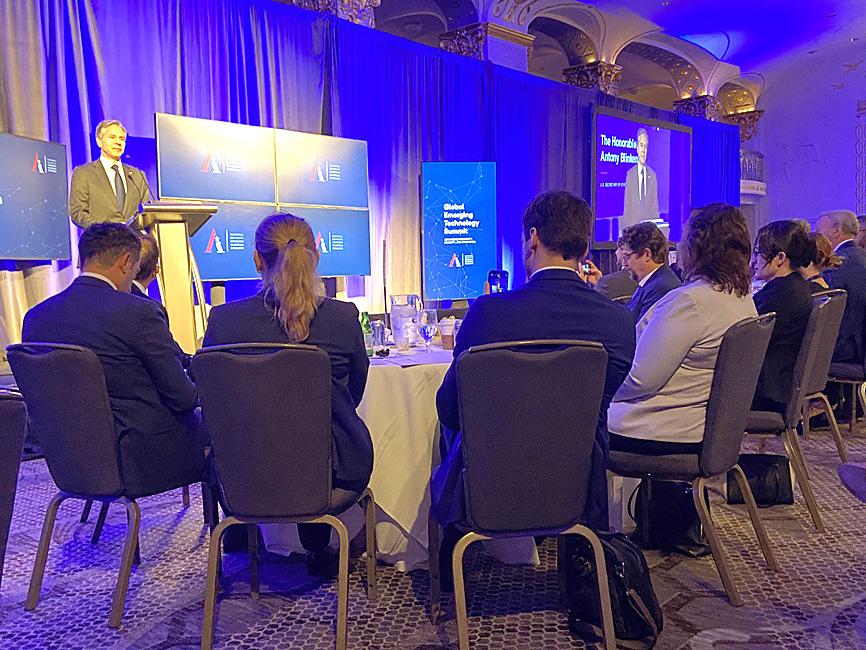The US National Security Commission on Artificial Intelligence on Tuesday hosted the first Global Emerging Technology Summit, attended virtually by Minister Without Portfolio Audrey Tang (唐鳳) and physically by Representative to the US Hsiao Bi-khim (蕭美琴).
US Secretary of State Antony Blinken, US Secretary of Defense Lloyd Austin, US Secretary of Commerce Gina Raimondo and US National Security Adviser Jake Sullivan delivered speeches in person, the Taipei Economic and Cultural Representative Office (TECRO) in the US said in a news release yesterday, which included a photograph of Hsiao at the meeting in Washington.
Blinken said that “it’s not enough to highlight the horrors of techno-authoritarianism, to point to what countries like China and Russia are doing, and say that it’s wrong and dangerous,” adding that democracies have to pass the tech test together.

Photo courtesy of the Taipei Economic and Cultural Representative Office in the United States
“We know China is determined to become the world’s technology leader, and they have a well-resourced and comprehensive plan to achieve those ambitions,” he said. “We must preserve our competitive and comparative advantages.”
“That means building resilient, diverse and secure supply chains for critical technologies. Our proposed investments in semiconductor manufacturing here at home is an important part of that,” he said.
Blinken highlighted the importance of 5G security and trustworthy artificial intelligence, as well as setting technical standards and creating norms for emerging technologies.
“In the coming weeks, the [US] State Department will be releasing its first ever data strategy to help us use data more effectively and more creatively for diplomacy,” he said.
Tang delivered a prerecorded speech on digital democracy during a section on the summit’s agenda titled “Israel and Taiwan Remarks.”
Digital democracy in Taiwan means promoting transparency and making the state transparent to its citizens, Tang said.
However, in a regime dominated by digital authoritarianism, transparency means making citizens transparent to the state, she said.
Taiwan is no stranger to the most unrelenting disinformation campaigns in the world. While the government does not enforce any top-down or lockdown information initiatives, it promotes decentralized approaches to combat an “infodemic,” she said, referring to rapid and far-reaching spread of accurate and inaccurate information.
For example, Tang said that before she joined the Cabinet, she helped set up an open system of communications to prevent disinformation during the 2014 Sunflower movement.
During the COVID-19 pandemic, the government engaged social engineers to develop an online mask map system and a contact tracing system using the 1922 short message service, she said.
Taiwan has a huge amount of high-quality data, a world-class semiconductor industry, smart manufacturing, strong computing power and advanced networking infrastructure, while following a democratic model of governance, Tang said.
The government is also promoting the Digital Nation and Innovative Economic Development Program, also known as Digi+, which encompasses digitalization, innovation, governance and inclusion, in a bid to transform Taiwan into a critical force in the global economy, she said.
Taiwan has the determination and capability to be a reliable partner for the US and the international community of democracies regarding artificial intelligence strategies, for the sake of people’s prosperity, security and welfare, Tang said.
Top officials from other nations — including New Zealand Prime Minister Jacinda Ardern, NATO Deputy Secretary-General Mircea Geoana, Japanese Minister of State for Science and Technology Policy Shinji Inoue, South Korean Minister of Science and Information Communication Technology Lim Hye-sook — joined the meeting via videoconference or shared pre-recorded speeches, TECRO said.

The Ministry of Economic Affairs has fined Taobao NT$1.2 million (US$36,912) for advertisements that exceed its approved business scope, requiring the Chinese e-commerce platform to make corrections in the first half of this year or its license may be revoked. Lawmakers have called for stricter enforcement of Chinese e-commerce platforms and measures to prevent China from laundering its goods through Taiwan in response to US President Donald Trump’s heavy tariffs on China. The Legislative Yuan’s Finance Committee met today to discuss policies to prevent China from dumping goods in Taiwan, inviting government agencies to report. Democratic Progressive Party Legislator Kuo Kuo-wen (郭國文) said

The Ministry of Economic Affairs has fined Taobao NT$1.2 million (US$36,900) for advertisements that exceeded its approved business scope and ordered the Chinese e-commerce platform to make corrections in the first half of this year or its license would be revoked. Lawmakers have called for stricter supervision of Chinese e-commerce platforms and more stringent measures to prevent China from laundering its goods through Taiwan as US President Donald Trump’s administration cracks down on origin laundering. The legislature’s Finance Committee yesterday met to discuss policies to prevent China from dumping goods in Taiwan, inviting government agencies to report on the matter. Democratic Progressive Party

Taiwan and its Pacific ally Tuvalu on Tuesday signed two accords aimed at facilitating bilateral cooperation on labor affairs, according to Taiwan’s Ministry of Foreign Affairs (MOFA). The governments inked two agreements in Taipei, witnessed by Foreign Minister Lin Chia-lung (林佳龍) and visiting Deputy Tuvaluan Prime Minister Panapasi Nelesone, MOFA said in a news release. According to MOFA, the agreements will facilitate cooperation on labor issues and allow the two sides to mutually recognize seafarers’ certificates and related training. Taiwan would also continue to collaborate with Tuvalu across various fields to promote economic prosperity as well as the well-being of their

Sung Chien-liang (宋建樑), who led efforts to recall Democratic Progressive Party (DPP) Legislator Lee Kun-cheng (李坤城), was released on bail of NT$80,000 today amid outcry over his decision to wear a Nazi armband to questioning the night before. Sung arrived at the New Taipei District Prosecutors’ Office for questioning in a recall petition forgery case last night wearing a red armband bearing a swastika, carrying a copy of Adolf Hitler’s Mein Kampf and giving a Nazi salute. Sung left the building at 1:15am without the armband and covering the book with his coat. Lee said today that this is a serious